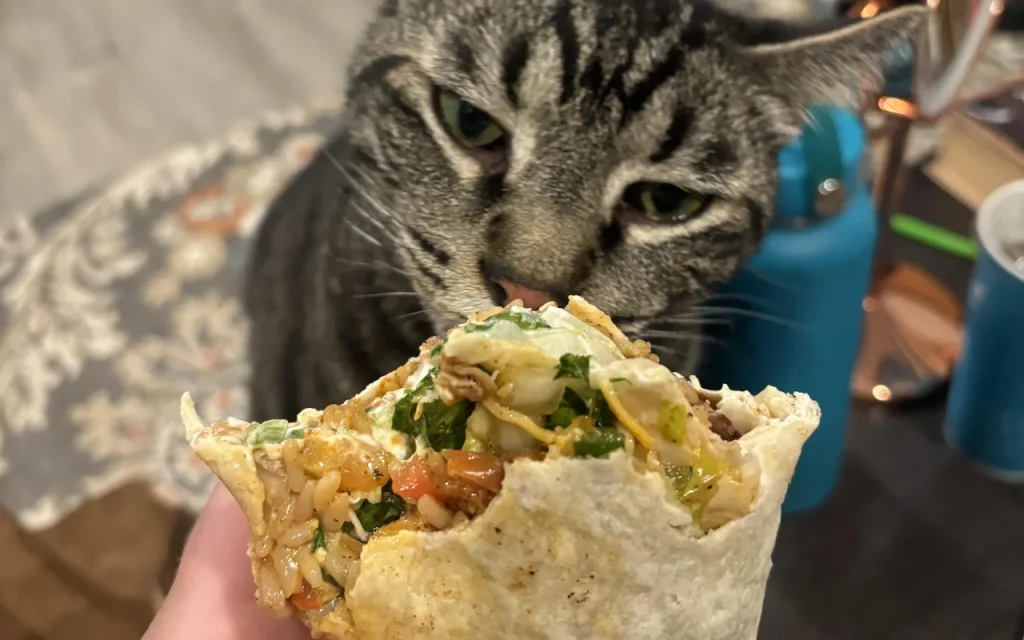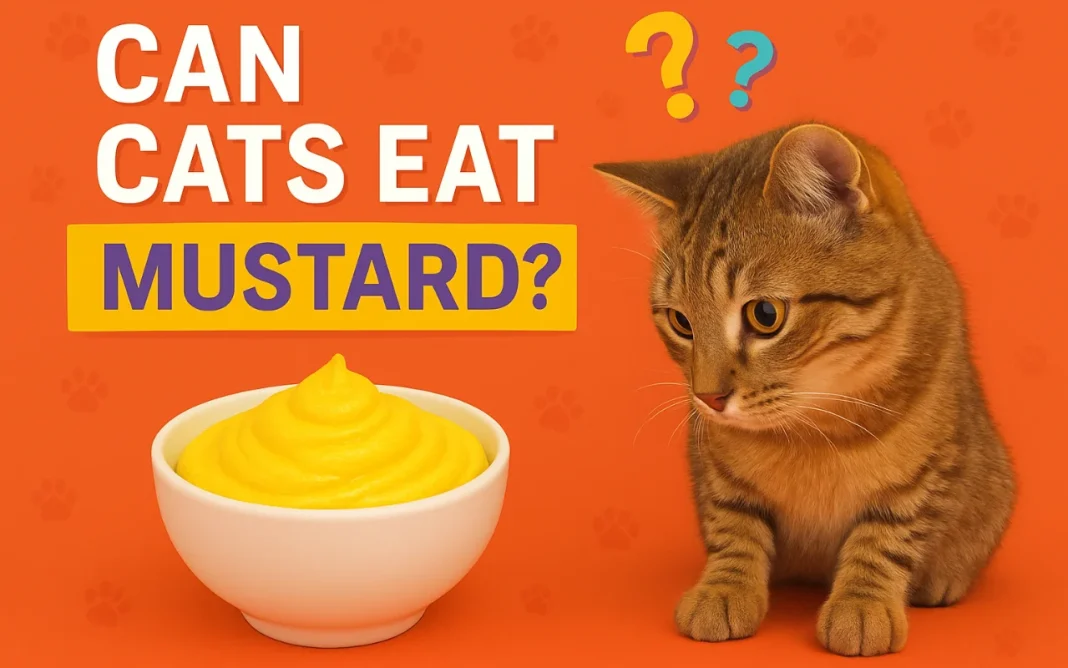You know how it goes, right? You’re settling in with a sandwich, maybe having a bit of a barbecue, and then – whoops! – a rogue dollop of mustard makes a bold leap for freedom, landing just where your super-inquisitive kitty might decide to launch an immediate, and possibly regrettable, taste-test. That immediate thought flashes through your mind: “Hang on a second, is mustard even okay for cats?” It’s a super valid question, and one I get asked in various forms as a vet.
So, let’s cut right to the chase on this one. When it comes to our cats and that tangy yellow (or brown, or dijon!) stuff, the general veterinary advice is pretty straightforward: Nope, mustard isn’t really safe for cats, and it’s definitely something you should try to keep well away from them. Now, before you panic if your cat just had the tiniest, accidental taste, it’s not usually a five-alarm fire for every single cat. But, and this is a big “but,” mustard has certain things in it that can cause some rather unpleasant tummy troubles, and sometimes even more serious issues, for our little carnivores.
Let’s dive into why mustard and cats generally don’t see eye-to-eye, what you should keep an eye out for if your cat does get into it, and the best plan of action.
So, What’s the Actual Problem with Mustard for Cats? The Problematic Parts
The main reason mustard is on the “please don’t feed this to your cat” list comes down to the mustard seeds themselves (and the powder made from them). These little seeds, from plants in the Brassica family (yep, same family as broccoli and cabbage, but the seeds pack a different kind of punch!), contain substances that can be real irritants or even a bit toxic for our feline buddies:
- Those Spicy Culprits – Isothiocyanates: This is the big one. Mustard seeds have these things called glucosinolates, which, when the seed is crushed up – like when it’s chewed or digested – break down into isothiocyanates. These are the chemicals that give mustard its sharp, spicy kick that many of us humans quite like. But for cats? Their digestive systems are much more sensitive, and these compounds can be pretty potent irritants to their stomach and intestines. Think of it like a chemical irritant upsetting their delicate digestive lining. Ouch!
- Goitrogens – A Longer-Term Worry: Mustard plants also contain substances known as goitrogens. Now, this is usually more of a concern if a cat was eating a lot of it over a long period, but it’s still worth knowing about. Goitrogens can mess around with how the thyroid gland normally works by interfering with its ability to use iodine properly. Given how common thyroid problems (like hyperthyroidism, an overactive thyroid) are in older cats, it’s just another good reason to keep mustard off their menu.
- And What Else is in That Jar of Prepared Mustard? Let’s not forget, that squirty mustard or the stuff in a jar isn’t just plain mustard seed. It often has other ingredients that aren’t great for cats either:
- Vinegar: This is often a main ingredient, and it’s pretty acidic. That acidity can add to the stomach irritation.
- Salt: Prepared mustards can be surprisingly high in salt (sodium), which really isn’t good for cats, especially if they have any underlying heart or kidney issues.
- Mystery Spices & Other Bits: Some mustards might also contain things like garlic or onion powder (and while the amount in a tiny taste is usually too small to cause serious toxicity from those ingredients, it’s still not ideal), or other spices that could just upset their tummy. And those “hot” mustards? They might even have capsaicin from chili peppers, which is another definite irritant.
And hey, don’t forget about the actual mustard plant, if you’ve got one beautifying your garden! Those leaves and flowers? Turns out, they can stir up similar tummy troubles for a cat who fancies a nibble, mostly because they’re hiding the same kinds of spicy, irritating bits that are in the seeds. So, if mustard plants are part of your landscaping, playing it safe and keeping kitty away from them is a pretty smart move.
Uh-Oh, Did Kitty Get Some Mustard? Signs to Watch For
If you think your cat might have had a sneaky lick or eaten some mustard, the main things you’re likely to see are signs of an upset stomach. How bad it gets can really depend on how much they ate, what kind of mustard it was (spicy stuff is usually worse), and just how sensitive your individual cat is.
Keep your eyes peeled for:
- First thing you might see? Yup, they could start throwing up. It’s often their body’s super quick, if not very pleasant, way of saying, ‘Nope, this doesn’t belong in here!’
- Then there’s the other end… you might be dealing with some runny poops, maybe watery stuff or perhaps a bit slimy with mucus.
- And does their little belly seem tender? Sometimes they’ll hunch over, or perhaps even let out a yelp if you try to give them a tummy rub. Hiding away more than usual can be a clue too, poor things.
- Drooling More Than Usual: This can happen if they’re feeling nauseous or if their mouth is irritated.
- Not Interested in Food: If their stomach is feeling rough, they probably won’t be very keen on eating.
- Just Seeming a Bit Flat or Tired (Lethargy): Feeling unwell can really knock the stuffing out of them.
“Now, for most healthy adult cats, if they had a truly tiny, accidental lick of plain old mild yellow mustard from your finger, they might not show any signs at all, or maybe just a bit of a lip-smack from the funny taste,” a vet might reassure you. “But, and this is important, if they’ve actually eaten mustard seeds, or mustard powder, or a more significant blob of prepared mustard – especially if it’s one of the really hot and spicy types – then the chances of them getting a noticeable tummy upset go up quite a bit.”
What to Do if Your Cat Has Eaten Mustard: Your Action Plan

- First, Don’t Panic (But Do Act Smart): Gently take away any remaining mustard so they can’t get any more. If they have any on their mouth or fur, you can try wiping it gently with a damp cloth.
- Try to Figure Out How Much (and What Kind): Was it really just a tiny speck of mild yellow mustard that dropped on the floor? Or did they somehow get into a whole container of mustard seeds, or gobble down a big spoonful of extra-hot Dijon? The type of mustard and how much they ate really does make a difference.
- Super Important: Do NOT Try to Make Your Cat Vomit: Never, ever try to induce vomiting in your cat at home unless a veterinarian has specifically told you to do so, and exactly how to do it. Sometimes, trying to make them sick can actually do more harm than good.
- Time to Call Your Vet or a Pet Poison Helpline: This is your most crucial step, especially if:
- You think they ate more than just a really tiny lick.
- They definitely ate mustard seeds or mustard powder.
- Your cat is showing any of those signs of tummy upset we just talked about.
- Your cat is very young, very old, or already has some other health issues going on.
- Keep a Really Close Watch: If your vet advises you to monitor your cat at home, you’ll want to keep a very careful eye on them for the next 24 to 48 hours for any developing signs. Make sure they have plenty of fresh water available. If they’re not vomiting, your vet might suggest offering a small amount of their regular food, or maybe even a bland diet (like plain boiled chicken and rice, if your cat will eat it) for a day or so.
So, What’s the Vet-Reviewed Bottom Line on Mustard?
To bring it all back to that first question:
- Is any kind of mustard really “safe” for cats? Honestly, no, not really. It’s just best to keep it off their menu altogether.
- But what if it was just a tiny, accidental lick of plain yellow mustard? “Look, in many situations, if a healthy adult cat has a single, very tiny taste of mild prepared mustard, they might be perfectly fine, maybe just pull a funny face,” a vet might clarify. “However, because cats can be sensitive and those irritating compounds are in there, it’s never something we’d actually recommend letting them eat, not even a little bit.”
- Are mustard seeds or mustard powder worse? Yes, generally they are. They’re a more concentrated source of those irritating isothiocyanates, so they carry a higher risk of causing more significant tummy upset.
And what if you stumble across a ‘cat-friendly’ recipe online that, surprise, lists mustard as an ingredient? My advice? Raise an eyebrow and be a tad skeptical. Just because someone on the internet says it’s okay doesn’t always make it so. If mustard’s in there, it’s a really good idea to quickly check with your own vet first, or maybe just find a different recipe altogether. Honestly, there are heaps of other, much safer ways to make food interesting for your cat if that’s what you’re after.
Stopping Mustard Mayhem Before It Starts (The Best Plan!) So, how do we dodge these mustardy mishaps altogether? Well, you know that old saying about an ounce of prevention being worth a pound of cure? It’s spot on here. The easiest, no-fuss way to keep your furry friend safe from any mustard drama is simply to make sure mustard, and anything with mustard in it, stays well out of their curious paws’ reach. Tuck those condiment jars away safely, be a bit like a ninja catching any dropped bits of food when you’re making dinner or having a snack, and try to get into the habit of not leaving plates with mustardy leftovers lying about where a bold kitty investigator might just decide to conduct their own taste-test.
In a Nutshell: When in Doubt, Leave the Mustard Out (and Call Your Vet if Worried!) So, when all’s said and done, even if the idea of your cat sampling some mustard sounds like a quirky little tale, the bottom line? It’s really one of those human foods that’s much, much better kept completely separate from our cat companions. That chance of an unhappy tum, a bit of actual discomfort for your poor cat, and then you having to deal with the not-so-fun clean-up – it’s just not a gamble worth taking, is it?
Now, if despite your best efforts, a tiny, accidental lick does occur, try to take a deep breath first. Then, get a clear idea of what exactly they got into and how much. And then? Please, never feel silly or like you’re overreacting by giving your veterinarian a quick call. Truly, they are always going to be your number one go-to for helping you make sure your cat stays the healthy, happy, mustard-free rascal you adore!

